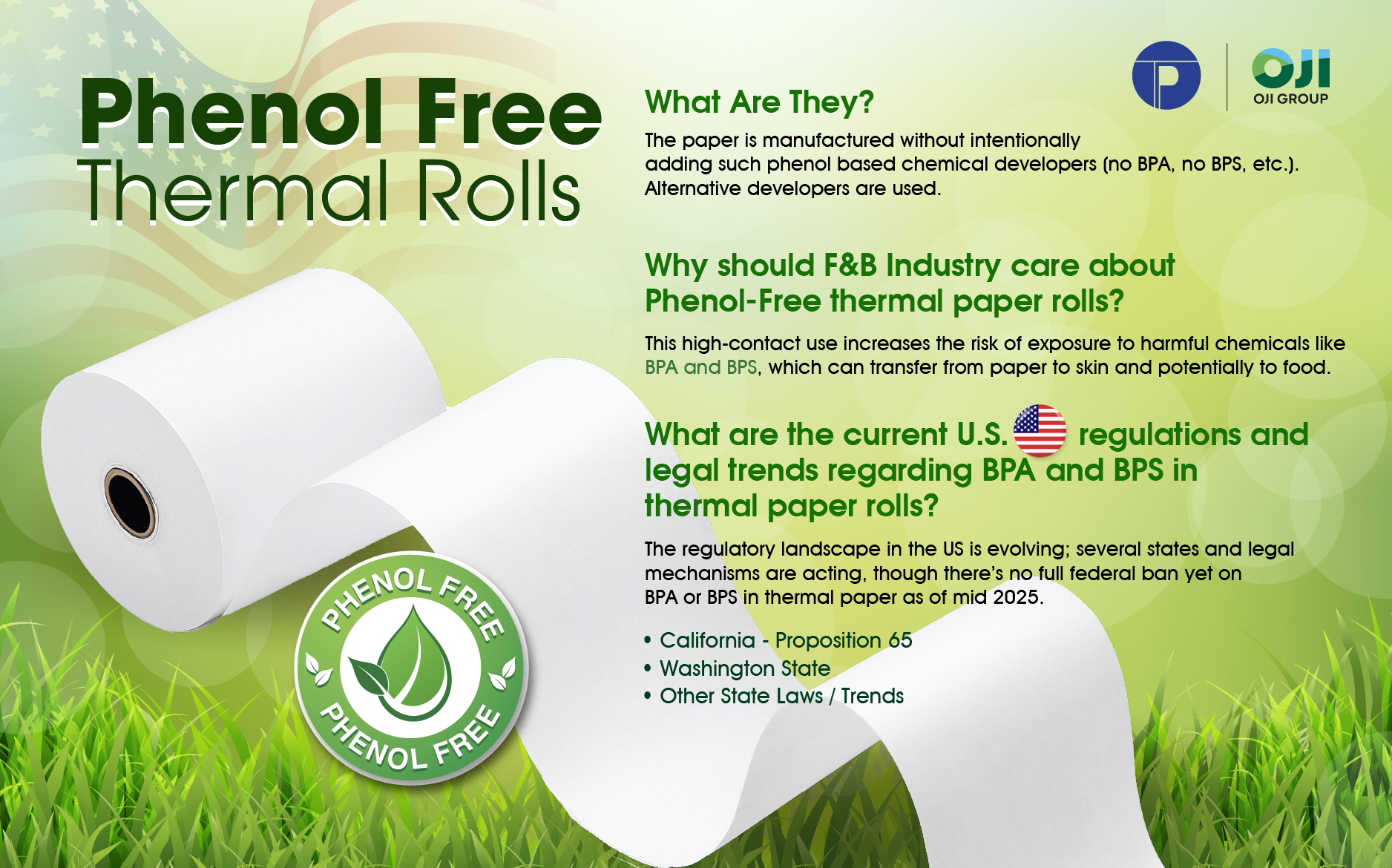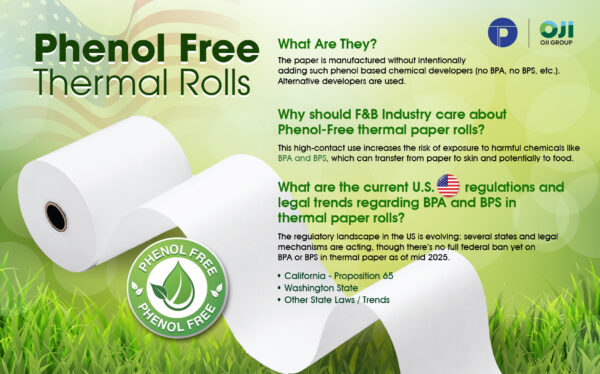Phenol‑Free Thermal Rolls: What Are They?
- Thermal paper is paper coated with a chemical layer that darkens when heated (in a thermal printer) to form printed text or image, without need for ink or toner.
- Traditionally, this coating (the developer) has used phenol‑based compounds like BPA (Bisphenol A) or BPS (Bisphenol S) or similar. These help trigger the chemical reaction when heat is applied.
- “Phenol‑free” means that the paper is manufactured without intentionally adding such phenol‑based chemical developers (no BPA, no BPS, etc.). Alternative developers are used.
Why are phenol-free thermal paper rolls becoming increasingly important, particularly in relation to health, regulatory compliance, and consumer expectations?
Phenol-free thermal paper rolls are gaining importance due to growing health, regulatory, and consumer concerns. Traditional thermal papers often contain BPA or BPS, which can pose health risks through frequent handling. With increasing regulations, like bans in Washington State and warning requirements in California, businesses must adapt to remain compliant. At the same time, consumers are demanding safer and more sustainable products.
Why should F&B Industry care about Phenol-Free thermal paper rolls?
In F&B sector, thermal rolls are essential for printing receipts, order tickets, kitchen slips, and labels—items handled frequently by staff and customers alike. This high-contact use increases the risk of exposure to harmful chemicals like BPA and BPS, which can transfer from paper to skin and potentially to food.
Additionally, the industry faces growing regulatory pressure as states implement bans and labeling requirements on bisphenol-containing papers. Non-compliance risks fines and damages to reputation, especially as customers become more aware and concerned about chemical safety.
What are the current U.S. regulations and legal trends regarding BPA and BPS in thermal paper rolls?
The regulatory landscape in the US is evolving; several states and legal mechanisms are acting, though there’s no full federal ban yet on BPA or BPS in thermal paper as of mid‑2025.
California ‑ Proposition 65
- BPS was added to the Prop 65 list of chemicals in December 2023. Since then, BPS is considered a chemical known to cause reproductive harm, which triggers certain requirements. S
- Under Prop 65, businesses with 10 or more employees must provide clear and reasonable warnings if their products expose consumers to listed chemicals over certain thresholds. Thermal receipts containing BPS (and other listed chemicals) may require warnings.
- A number of enforcement actions / “Notices of Violation” (NOVs) have been issued in California to companies whose thermal receipt paper allegedly contains BPS without proper warnings.
Washington State
- Washington has passed regulation under its Safer Products for Washington / WAC 173‑337 rule, to ban bisphenols (both BPA & BPS) in thermal receipt paper: manufacture, sale, or distribution will be prohibited as of January 1, 2026.
- The law covers thermal receipt paper specifically. It includes a product replacement program, and there are reimbursement tiers to help businesses transition (for replacing POS/printer devices or switching paper).
Other State Laws / Trends
- Illinois: In 2019, Illinois passed a law (HB 2076) prohibiting BPA in thermal paper, effective January 1, 2020.
Source: https://agilitypr.news/BPA-in-Thermal-Paper-Banned-in-Illinois%2C-5924?
- Connecticut also has measures on BPA in receipt paper.
- Some counties or cities have taken action (for example, Suffolk County, NY banned thermal paper coated with BPA.
What are the Advantages of Phenol‑Free Thermal Paper particularly for F&B sector?
Phenol-free thermal rolls offer clear advantages for F&B industry. They eliminate exposure to harmful chemicals like BPA and BPS, protecting staff and customers from potential health risks linked to skin contact with receipts and order tickets. With increasing regulations—such as California’s Prop 65 and Washington’s upcoming ban—phenol-free paper ensures legal compliance and reduces liability. It also supports a cleaner, health-conscious brand image, aligning with growing consumer demand for safer, more sustainable practices. For F&B businesses, making the switch is a proactive, future-proof decision.
What are the challenges when switching to Phenol-Free thermal paper rolls?
While phenol-free thermal paper offers health and regulatory advantages, the transition comes with a few challenges. Cost is a key factor—these papers often carry a higher price tag due to alternative coating technologies, and some printers may need adjustment or replacement. Print quality and durability can also vary; certain phenol-free papers may fade faster or require different temperature settings to achieve proper contrast, especially in high-humidity kitchen environments.
Supply chain availability is another concern, particularly for small or multi-location F&B businesses that need consistent stock and compatible roll sizes. It’s important to verify that suppliers offer certified, truly phenol-free products—not just “BPA-free” variants that may still contain BPS. Finally, educating staff and customers about the change—especially if the paper looks or feels different—is essential to maintain confidence and ensure smooth adoption.
By planning ahead and working closely with suppliers, F&B businesses can overcome these hurdles and make a smooth, compliant transition.
For more information on phenol-free thermal paper rolls, please contact our salesperson, Ms. Elsa Soon at +6010 566 9569 or email at elsa.soon@telepaper.com


